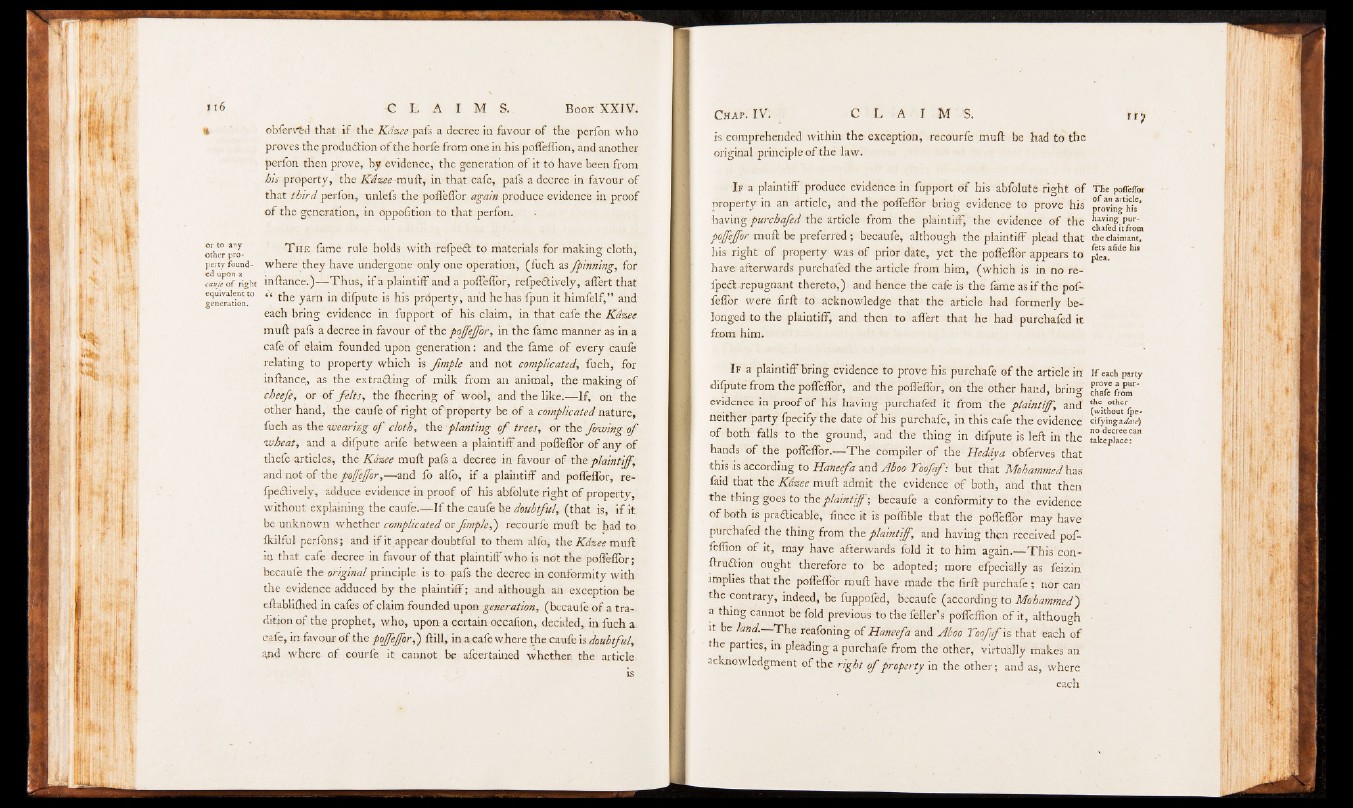
obfervtd that if the Kd%ee pafs a decree in favour of the perfon who
proves the production of the horfe from one in his poffeffion, and another
perfon then prove, by evidence, the generation of it to have been from
his property, the Kdzee mult, in that cafe, pafs a decree in favour of
that third perfon, unlefs the pofleflor again produce evidence in proof
■ of the generation, in oppofition to that perfon.
other pro- T h e fame rule holds with refpedt to materials for making cloth,
petty found- where they have undergone only one operation, (fuch as fbinning, for
cauje o f right inftance.)— Thus, i f a plaintiff and a poffeffor, refpedtively, affert that
generation10 “ t^le y arn i'1 difpute is his property, and he has {pun it himfelf,” and
each bring evidence in fupport of his claim, in that cafe the Kdzee
muff pafs a decree in favour of the poffeffor, in the fame manner as in a
cafe of claim founded upon generation: and the fame of every caufe
relating to property which is Jimfle and not complicated, fuch, for
inftance, as the extracting of milk from an animal, the making of
cheefe, or of fe lts , the Iheering of wool, and the like.— If, on the
other hand, the caufe of right of property be o f a complicated nature,
fuch as the wearing o f cloth, the planting o f trees, or the fowing o f
wheat, and a difpute arife between a plaintiff and poffeflor o f any of
t-hefe articles, the Kdzee muft pafs a decree in favour of the plaintiff,
and not of the pofleffor,— and fo alfo, if a plaintiff and pofleflor, re-
fpeCtively, adduce evidence in proof of his abfolute right of property,
without explaining the caufe.— If the caufe be doubtful, (that is, if it
be unknown whether complicated or fmple,') recourfe muft be had to,
fkilful perfons; and if it appear doubtful to them alfo, the Kdzee muft
in that cafe decree in favour of that plaintiff who is not the poffeflor;
becaufe the original principle is to pafs the decree in conformity with
the evidence adduced by the plaintiff; and although an exception be
eftablifhed in cafes of claim founded upon generation, (becaufe of a tradition
of the prophet, who, upon a certain occafion, decided, in fuch a
cafe, in favour of the poffeffor,') ftill, in a cafe where the caufe is doubtful,
and where of courfe it cannot be afcertained whethen the article
is comprehended within the exception, recourfe muft be had to the
original principle of the law.
I f a plaintiff produce evidence in fupport of his abfolute right of The poffeflor
property in an article, and the poffeffor bring evidence to prove his provinghn'
having purchafed the article from the plaintiff, the evidence of the h.avinS Puf-
/ r / r n . i r i i r 1 1 chafed itfrom fojjejjor mult be preferred; becaufe, although the plaintiff plead that the claimant,
his right of property was of prior date, yet the poffeflor appears to hi‘
have afterwards purchafed the article from him, (which is in no re-
fpect repugnant thereto,) and hence the cafe is the fame as if the poffeffor
were firft to acknowledge that the article had formerly belonged
to the plaintiff, and then to aflert that he had purchafed it
from him.
I f a plaintiff bring evidence to prove his purchafe of the article in i f each party
difpute from the poffeffor, and the poffeffor, on the other hand, bring S c from"’
evidence in proof of his having purchafed it from the plaintiff, and *,he. ,othcr,
• v t. r -c i t WSKm . £ ** 7 (without Ipeneitner
party lpecify the date or his purchafe, in this cafe the evidence cifyinga<&/*)
of both falls to the ground, and the thing in difpute is left in the takeplacl:“
hands of the pofleflor.— T h e compiler of the’111 eddy a obferves that
this is according to Haneefa and /Iboo Y'oofuf' but that Mohammed has
faid that the Kdzee muft admit the evidence of both, and that then
the thing goes to the plaintiff-, becaufe a conformity to the evidence
of both is prafficable, fince it is poffible that the poffeffor may have
purchafed the thing from the plaintiff, and having then received poffeffion
of it, may have afterwards fold it to him again.— This con-
ftruftion ought therefore to be adopted; more efpecially as feizin
implies that the poffeffor muft have made the firft purchafe; nor can
the contrary, indeed, be fuppofed, becaufe (according to Mohammed')
a thing cannot be fold previous to the feller’s poffeffion of it, although •
it be land. The reafoning of Haneefa and Aboo Ybofaf is that each of
the parties, in pleading a purchafe from the other, virtually makes an
acknowledgment of the right o f property in the other; and as, where
each